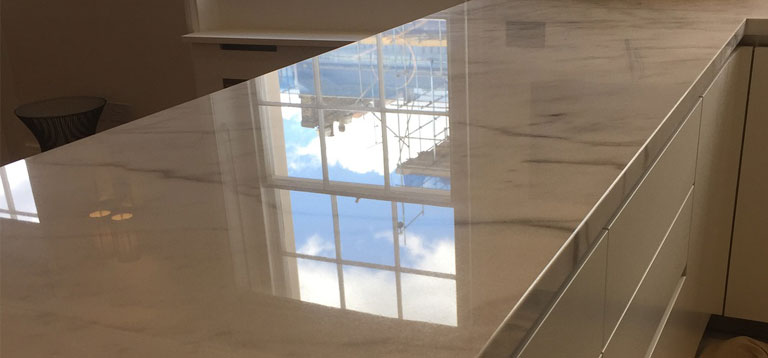Last Updated on March 10, 2019 by Royal Stone Care
Thanks to its natural beauty and strength, designers and homeowners alike love marble. They have long seen it as a highly viable option for the most important room in any home – the kitchen.
After all, this substance’s bright, clean appearance is guaranteed to bring more than a dash of elegance to any kitchen.
What’s more, the coolness of the surface makes it ideal for baking tasks like kneading dough.
To give it its technical term, marble is a type of metamorphic rock which is not made up of layers of stone. So, typically, it consists of magnesium or calcium carbonate. And while this makes marble durable, it also means the stuff can be vulnerable to acid spillages, which dull the surface.
So, like anything else, marble is certainly not indestructible. And, without proper care, over time, your countertop could ‘etch’ – or become discoloured.
With kitchen countertops typically costing up to 10 or even 15% of a home’s value, it pays to choose wisely. Take your time before making your decision.
Colour
Marble comes in a full spectrum of colours, from greys and blacks to even greens and reds. Even the popular white shades can differ in terms of veining and how light they look. In fact, white is actually a pretty good choice since, if you do get discolouring or etching, it’s less likely to show up.
Veining
When you’re looking at detailing, pay particular attention to the veining of the marble. Look at where the veins in the design end, so that you create a seamless look across your kitchen. For continuous veining, get a slab of marble that’s as long as the proportions of your room (and finances) allow.
Alternatively, match the separate pieces closely with a strategic cut. A cross-cut slab of marble has softer veins which look as though they fan outwards, while a vein-cut one is a more clearly defined linear piece.
Daily care and protection
You can look after your marble countertop on a daily basis with a common-sense approach to its care. Knives, staining agents and hot pans or appliances are among the most likely causes of damage.
Thick pot holders and big cutting boards will help protect against temperature changes and cuts. Equally, use natural, mild cleaners and soft cloths for marble cleaning and you’ll deal with most regular messes without leaving any abrasions behind.
Finally, your marble countertop may need to be sealed after you’ve had it for a while. Test by adding a few drops of water to its surface. If the stone absorbs the drops within four minutes, sealing may be needed.
If you have quartz countertop though, you may find our page on quartz countertops interesting. It will debate the advantages of such worktops and the reason for its popularity in the UK.
How we can help
At Royal Stone Care, we’re stone cleaning specialists. We handle marble repair and polishing with our team of dedicated experts. Let us take care of all those times when something more than daily cleaning is required, whether that’s a deep polish, resealing or marble chip repair.
Our quality is guaranteed, and we are, of course, comprehensively insured. What’s more, we work in a range of domestic and commercial settings, from banks and shops to private homes. Talk to us about any aspect of your marble care today – and request a free quote.

